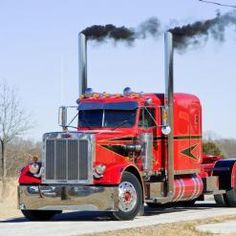 The Trump administration has withdrawn a proposed law to screen truckers for a hazardous sleep condition. Sleep apnea can threaten the lives of every driver on the road, because sleep-deprived drivers are a potential danger to every other driver. Nevertheless, President Trump sees it as an unnecessary regulation overly burdensome to truckers.
The Trump administration has withdrawn a proposed law to screen truckers for a hazardous sleep condition. Sleep apnea can threaten the lives of every driver on the road, because sleep-deprived drivers are a potential danger to every other driver. Nevertheless, President Trump sees it as an unnecessary regulation overly burdensome to truckers.How Asleep should Truckers Be on the Road?
The Atlantic Monthly asks, “How asleep should truck drivers be on the job?” Public Citizen, meanwhile, is leading a related lawsuit against President Trump’s edict that no new regulation can be put into law unless two other regulations are rescinded. This idea – backed by the Koch Brothers, Chamber of Commerce and ALEC – may benefit corporations, but it puts ordinary citizens at risk.
Conductor with Sleep Apnea injures 100 People
Sleep apnea entered the national safety debate with a bang last summer in New Jersey when a conductor with undiagnosed sleep apnea crashed his train into a crowded station in Hoboken. That accident injured more than 100 people. Obstructive sleep apnea affects alertness. It can make people spontaneously sleep even during stimulating activities.
The New Jersey accident is just one high profile case. How many tragic trucking accidents have been caused by truck drivers with undiagnosed sleep apnea? That number is sure to be at least in the hundreds, considering the number of commercial truck drivers and train engineers who use the nation’s public roads and rail tracks.
In March of 2016, the Obama administration proposed that deadly sleep-related accidents should be prevented where possible. One approach was to begin sleep apnea-screening of train engineers and truck drivers.
On August 11, 2017, the Trump administration announced that it had withdrawn that proposed sleep test requirement. The reason was the same as always, part of a larger effort to remove any regulations that might limit economic growth.
NTSB “Disappointed” with Change
The National Transportation Safety Board, which has advocated screening truckers for sleep apnea for years, said through a spokesmodel that it was “disappointed” that the DOT withdrew this “much-needed” rule.
Sleep Apnea affects 1 in 10 People
The sleep-inducing condition is increasingly common, affecting at least one in 10 people to some degree. Obstructive sleep apnea in serious cases can give someone symptoms that sound like classic narcolepsy. Such a person can fall asleep with little to no warning. It is similar to narcolepsy, though the primary problem is respiratory. People with sleep apnea don’t breathe well while sleeping at night. This degrades the quality of the sleep, and leaves people impaired and exhausted throughout the day.
Trump moves to stop Screening Truck Drivers for Sleep Disorder
The problem with dropping screening is that sleep apnea applies even to many people who report sleeping well for seven or eight hours each night. These people are unaware that their breathing interruptions are precluding deep, restorative cycles. Without those deep cycles, accidents are more likely to happen. It only makes sense to screen people whose jobs involve trucking or training enormous machines at high velocities, always a potential recipe for human tragedy.
Trucker Objections Fair
Many truckers fairly object to being tested for sleep apnea if they have to pay for it themselves. It can cost upwards of $1,000. The fair answer is to make the corporations pay for the testing. Those that make the most profits from our roads need to pay the freight to better safeguard those who do the heavy lifting and the OTR driving, as well as all the rest of us who must travel on public roads.
RELATED
- Houston Truck Accident Lawyer
- Houston Car Accident Attorney

by Matthews & Associates




